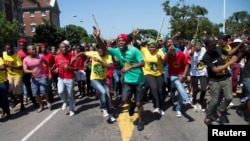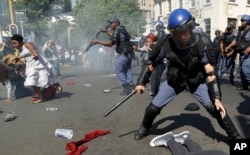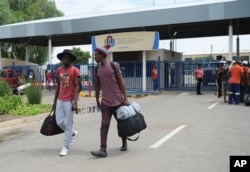Like many South African university students, Nontsikelelo Selleo is angry. And, like many young black South Africans, she says she struggles financially, but has yet to see the equality and prosperity promised with the end of apartheid two decades ago.
The effects of that anger have been seen across South Africa this week, as student protests for free university education have escalated, prompting several institutions to temporarily close, just as students are preparing for end-of-term exams.
Several large schools have reported vandalism against university property and scuffles between security staff and protesters. The University of the Witwatersrand, in Johannesburg, reported that authorities found fire bombs on campus over the weekend, tweeting a photo of what looked like homemade Molotov cocktails.
Protesting students barged into classes Monday at the University of Johannesburg, prompting Selleo's lecturer to cancel class. Now, says the 21-year-old accounting student, she's mad — at the protesters.
"As someone who's about to finish their degree now, and then this strike affects them, they fail or then something happens, then they have to repeat the modules next year," she said as she stood outside the university gates Monday.
At least four South African universities have closed as student protests turned violent following the government’s proposal last week of tuition hikes of up to 8 percent.
No end in sight
Students inside the movement say they won't let up until their demands are met.
Jafta Kolisang, a 28-year-old student getting a master’s degree in history, has been lurking outside the gates of the University of the Witwatersrand since he was suspended in June for participating in protests earlier this year.
"I don't regret it," he said. "I'm doing it for black students. Yes, myself, I've been in similar situations. When I completed my matric [high school diploma], I couldn't go study because I didn't have money. So we can't have that cycle of, I mean, that is violence itself."
His friend Josh Nel, who is white, is majoring in political philosophy and delivered a dialectic on why he supports the movement. He says he thinks the government should tax the super-wealthy to fund tuition.
"This is a long-overdue movement challenging the very economic foundations that continue to justify and perpetuate the super-exploitation of black labor by white capital," Nel said.
Free education called impossible
The head of the University of the Witwatersrand, Vice Chancellor Adam Habib, told VOA that while he sympathizes with the call for free education, South Africa's government doesn't have the means or the infrastructure to pull off such a feat.
His university will vote later in the week whether to close temporarily, as the issue rages throughout South Africa. Habib, a political scientist, offered a theory as to why this is happening now.
"I think we are reflecting the broader polarization in the society, which itself is a product of inequality,” he said.
Habib and others expressed concern over the violence and strong vein of populism that has distinguished the student movement. Many student protesters say they want universities to distance themselves from their colonial underpinnings; others have outright condemned university leaders for being "too intellectual."
Habib says he worries about this sentiment, and says it reminds him of anti-intellectual political supporters in the U.S.







